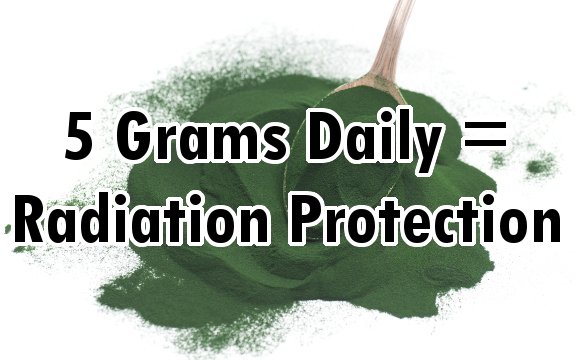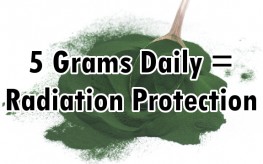Reverse Radiation Damage with 5 Grams/Day of this Deep Sea Medicine

 Thought to be one of the oldest life forms on earth, spirulina is an algae loaded with health benefits. In addition to boosting academic performance, combating arthritis, and preventing cancer, some of the most remarkable benefits come in its ability to protect against radiation.
Thought to be one of the oldest life forms on earth, spirulina is an algae loaded with health benefits. In addition to boosting academic performance, combating arthritis, and preventing cancer, some of the most remarkable benefits come in its ability to protect against radiation.
The radiation-protectant benefits of spirulina came to light after the Chernobyl disaster of 1986. In that nuclear reactor melt-down, hundreds-of-thousands of people were exposed to high levels of radiation. More than 160,000 children and 146,000 workers were victims of radiation poisoning.
Living and working in an environment polluted with radioactive toxins increased the incidence of birth defects, leukemia, cancers, thyroid diseases, liver and bone degeneration, and damaged immune functions. It was imperative that solutions be found.
In the recovery efforts, a British company reportedly sent over shipments of spirulina to treat the child victims. Children were given 5 grams of spirulina daily over a period of 45 days with remarkable results.
Compared with the children who didn’t receive spirulina, the algae-treated kids showed urine radioactivity levels decreased by 50% in only 20 days.
They also began the treatment with dangerously low white blood cell counts of about 1,000—typical in leukemia. After a period of 20 days, they rose to 3,000.
Finally, they had spinal fluid, blood cell, liver, and bone marrow regeneration not found in the children who weren’t treated with spirulina.
Read: Spirulina Enhances Anti-Cancer ‘Natural Killer Cell’ Abilities
The Belarus Ministry of Health concluded that “spirulina accelerates the evacuation of radionuclides from the human body,” without significant side effects.
Two Russian reports that followed in the 1990s from L.P. Loseva confirmed the initial findings and concluded:
“Spirulina platensis is an effective natural adsorbent of long-life radionuclides caesium-137, strontium-90, and potassium-40 and can lead to a reduction of radioactive contamination in children ages 10 to 16 years of age.”
Further, according to a scientific review of spirulina’s benefits in the Journal of Applied Phycology:
“Up to very recently, the interest in Spirulina was mainly in its nutritive value. Currently, however, numerous people are looking into the possible therapeutic effects of Spirulina.
Many pre-clinical studies and a few clinical studies suggest several therapeutic effects ranging from reduction of cholesterol and cancer to enhancing the immune system, increasing intestinal lactobacilli, reducing nephrotoxicity by heavy metals and drugs and radiation protection.”
There are several suggestions as to how spirulina protects against radiation. Some of those refer to its natural iodine content that is able to protect the thyroid and all glandular tissues throughout the body. It is also rich in antioxidants, vitamins, minerals, phytopigments, and metallo-thionine compounds—all of which play roles in protecting the body and even removing heavy metals and other toxins from within.
A rich source of antioxidants and offering numerous health benefits, spirulina is certainly a superfood worth examining. This is why we should all be protecting our deep-sea medicine, spirulina.

I am so grateful for this article … and also concerned. Much seaweed and marine life in the Pacific, off the west coast (US and Canada) is now tainted by Fukushima “plume”. Recently, the IAEA suggested that radioactive waters from Fukushima be dumped in the deep sea. MY QUESTION: Given this background, what sources of Spirulina should people be looking for? Supposedly, the southern Pacific is still untouched by this.
Thank you.
I would like the answer also
Try searching “Spirulina farming” in Google, you’ll see how some of those Spirulina pills or Spirulina powder production companies farm the seaweed in their plants, I think you don’t need to worry about the pollution problem…
depends where the air and water for those plants comes from
me too
The pollutants from Fukushima are much more severe.
Spirulina grows in fresh water lakes. Why the author refers to it as a “deep sea medicine” is a bit of a mystery. It also means that it is not directly affected by Fukushima, though indirectly, the who planet is being killed by it.
tara